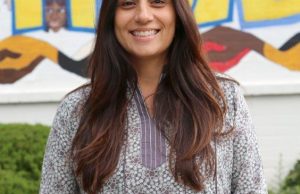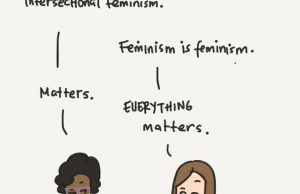Why We Must Write: A Reflection on Tenure Denial and Coloring Between the Lines
By Michelle Téllez
My terminal contract came to an end in May 2014, after tenure denial at the public university where I had worked as an Assistant Professor for eight years. I’ve been thinking about this moment for a few weeks now after my social media news feed was filled with tenure and promotion announcements this past spring. Even though I am honestly thrilled for my friends and colleagues, I am also acutely aware of the tenure denial announcements that remain unshared. Having had some time and space to reflect on the implications of tenure denial, particularly for women of color, it now feels right to share my perspective.
 Many people find “success” in the academy; they receive the necessary accolades and they move up the career ladder as they are supposed to. I can think of a number of academics who fall into this category. For many of them, I find that I am not particularly moved by their research, their writing, their spirit, or their interventions. I am not sure if they are either. But they write because this is what is expected of them, living by the “publish or perish” philosophy that has been indoctrinated into so many of us through our graduate school training. I’ve watched colleagues neatly compartmentalize their lives and their experiences in order to make sure they don’t “perish.”
Many people find “success” in the academy; they receive the necessary accolades and they move up the career ladder as they are supposed to. I can think of a number of academics who fall into this category. For many of them, I find that I am not particularly moved by their research, their writing, their spirit, or their interventions. I am not sure if they are either. But they write because this is what is expected of them, living by the “publish or perish” philosophy that has been indoctrinated into so many of us through our graduate school training. I’ve watched colleagues neatly compartmentalize their lives and their experiences in order to make sure they don’t “perish.”
Compartmentalizing certainly isn’t my strength. Gloria Anzaldúa (1983) taught me that the dangers in/of writing appear when we do not fuse our personal experience and worldview with the social reality we live in, with our inner life, our history, our economics, and our vision. More specifically, she writes, “What validates us as human beings validates us as writers.” I believe this is true for many women of color scholars who carry with them their stories of migration, displacement, struggle and survival in their writing. Yet, this is something that is not easily translatable to academic institutions.
 I remember sitting in front of the administrative assistant who was responsible for collating and submitting tenure dossiers to the tenure review committee. I was caught off guard when she paused from her methodical review of my materials to ask me about the status of my book project. When I responded that it wasn’t quite yet finished, she looked up at me with pity and asked, “Do you even like to write?” Avoiding her imploring eyes, I recalled an image of myself as a little girl, hunched over on my bed writing. There I was, scribing my deepest thoughts, secrets, and observations into a multi-colored hand-me-down Hello Kitty diary given to me in kindergarten. It dawned on me then in the assistant’s office that since my early childhood, I have never stopped writing.
I remember sitting in front of the administrative assistant who was responsible for collating and submitting tenure dossiers to the tenure review committee. I was caught off guard when she paused from her methodical review of my materials to ask me about the status of my book project. When I responded that it wasn’t quite yet finished, she looked up at me with pity and asked, “Do you even like to write?” Avoiding her imploring eyes, I recalled an image of myself as a little girl, hunched over on my bed writing. There I was, scribing my deepest thoughts, secrets, and observations into a multi-colored hand-me-down Hello Kitty diary given to me in kindergarten. It dawned on me then in the assistant’s office that since my early childhood, I have never stopped writing.
Yes!, I should have shouted, I like to write. But how could I find the words to explain to her that when I write it is not only for my career? That when I write, it is because I am inspired to do so because I want to share a story. That I think the stories not told are the most important.
 Yet somewhere along the line, I lost my inspiration. In part, there were personal losses—a painful custody battle, the terminal illness and eventual death of my mother—that deeply affected me. These were compounded by the institutional gaffes at the university, like the overwhelming new course preps (twelve distinct courses in the years before my tenure bid) and my commitment to graduating students. In our new Master’s degree program, I advised and chaired thesis committees for the majority of students when other faculty would not. I remember when, following a difficult faculty meeting that acutely highlighted not only the racial microaggressions but the power differentials between faculty, the program’s director said to me, “I know how oppressive things have been for you here and if you are given the opportunity to stay, we have to figure out how to make your life more livable.” I never got the opportunity to find out what that would have looked like. Moreover, during my first years on the tenure-track, there was an ever-mounting oppressive political environment in Arizona, targeted at the workers and families I had come to know in my work outside of the University that demanded political responses and commitments.
Yet somewhere along the line, I lost my inspiration. In part, there were personal losses—a painful custody battle, the terminal illness and eventual death of my mother—that deeply affected me. These were compounded by the institutional gaffes at the university, like the overwhelming new course preps (twelve distinct courses in the years before my tenure bid) and my commitment to graduating students. In our new Master’s degree program, I advised and chaired thesis committees for the majority of students when other faculty would not. I remember when, following a difficult faculty meeting that acutely highlighted not only the racial microaggressions but the power differentials between faculty, the program’s director said to me, “I know how oppressive things have been for you here and if you are given the opportunity to stay, we have to figure out how to make your life more livable.” I never got the opportunity to find out what that would have looked like. Moreover, during my first years on the tenure-track, there was an ever-mounting oppressive political environment in Arizona, targeted at the workers and families I had come to know in my work outside of the University that demanded political responses and commitments.
This work remained invisible to the institution.
I doubted myself over and over through the years, wondering if this path was really the right one for me, until I realized that it was up to me to decide what kind of scholar I wanted to be and who I wanted to be accountable to and for. Therefore, I had to start making hard decisions that went against the academic career grain. I chose to be present as much as possible with my dying mother and to be attentive to the needs of my young child. It also meant I put my time and energy into projects that grew and sustained my community and me but that also led to writing that was not originally part of my “research” plan.
 I turned down other tenure-track offers, knowing I was supposed to be racing to keep up with ticking clocks and timelines, I instead made a series of choices to focus on what I felt took precedence—my family, my health, my relationships. The problem, of course, is that this is not how academia works. Rather, academia requires the journey be linear and the puzzle pieces to fit perfectly together within a certain a time frame in order to ensure successful hurdle jumping.
I turned down other tenure-track offers, knowing I was supposed to be racing to keep up with ticking clocks and timelines, I instead made a series of choices to focus on what I felt took precedence—my family, my health, my relationships. The problem, of course, is that this is not how academia works. Rather, academia requires the journey be linear and the puzzle pieces to fit perfectly together within a certain a time frame in order to ensure successful hurdle jumping.
While tenure-denial was the consequence of many choices, some of which I had no control over, surviving in the aftermath has provided valuable lessons.
For me, it means that we have to ask ourselves in what ways we want to contribute to our world. I am even more convinced that we must do work that we are politically, spiritually, and emotionally connected to, work that is accountable to the communities that we represent and are tied to. When we lose this, there is also a loss of joy, creative freedom, and the ability to self-determine and shape our lives. I strongly believe this to be true for women of color writers and scholars whose legacies of colonialism, racism, and gendered and classed silencing follow us closely. We must reconfigure the ways in which we can disrupt the mold that many of us struggle to fit into as marginalized, classed, and raced writers.
 Our writing tells our truths and we are here to bear witness with our writing. This is why we must write. I no longer believe that writing has to be done only in isolation; writing collectively challenges the neoliberal, individualistic institution that encourages us to do things alone. Instead, through collective writing we find new meanings in experience. Frankly, not having the pressure to write for someone else’s approval has been liberating and healing. Pressure never pushed me in the past to complete work; in fact, it did just the opposite and turned into a constant cycle of self-deprecation, push-back, and doubt. It certainly did not feel like I was living a life that I self-determined.
Our writing tells our truths and we are here to bear witness with our writing. This is why we must write. I no longer believe that writing has to be done only in isolation; writing collectively challenges the neoliberal, individualistic institution that encourages us to do things alone. Instead, through collective writing we find new meanings in experience. Frankly, not having the pressure to write for someone else’s approval has been liberating and healing. Pressure never pushed me in the past to complete work; in fact, it did just the opposite and turned into a constant cycle of self-deprecation, push-back, and doubt. It certainly did not feel like I was living a life that I self-determined.
But listen. The material consequences of tenure denial are brutal, including the loss of income and benefits, which as a single mother not only affected me but my daughter as well. Indeed, the tremendous uncertainty about one’s future can be debilitating. But I wholeheartedly believe this: it’s important to remember our agency in this path. Despite the insecurity of the last two years, I feel like I have finally found my voice again and I remain as committed as ever to my work in whatever configuration that might be. For me, it’s meant staying within the University system and continuing to work in ways that honor my commitments but also reconfiguring the ways in which we define knowledge production. Some of these collective projects include the Arizona Ethnic Studies Network, the Entre Nosotr@s Collective, the Chicana Motherwork Project, and the Beyond Boundaries Initiative, all examples of projects that reflect how I want to contribute to the academy as a scholar-activist. I think we can find new ways of relating to and being in the university outside of the guidelines that have been set for us by others.
 This reminds me of another childhood memory: when I was a little girl, my dad and I would sit on the living room floor in the evenings and color; surrounded by crayons, markers, and coloring books, we would spend hours together doing this. His patience with me held strong as I policed his every move, especially when he colored outside the lines and colored people purple and the sky green. His coloring pages never reflected the reality I saw in front of me and I remember becoming frustrated with him for not following the “rules.” All he would do is laugh at me and ask, “But why mija, why can’t the bunny be purple?”
This reminds me of another childhood memory: when I was a little girl, my dad and I would sit on the living room floor in the evenings and color; surrounded by crayons, markers, and coloring books, we would spend hours together doing this. His patience with me held strong as I policed his every move, especially when he colored outside the lines and colored people purple and the sky green. His coloring pages never reflected the reality I saw in front of me and I remember becoming frustrated with him for not following the “rules.” All he would do is laugh at me and ask, “But why mija, why can’t the bunny be purple?”
I never realized the valuable message he shared with me so long ago: coloring inside the lines might mark you for a particular kind of success, but sometimes going outside of the lines and playing with color opens up possibilities that you never imagined were possible. There is no utopia for how things are “supposed” to be, particularly in an academic culture that is slow to respond to shifting cultural and social paradigms. But I cannot underscore this enough: as women of color writers, scholar-activists, and community-embedded teachers, our paths will not be typical, linear, nor will the puzzle pieces always fit perfectly together; instead, we have to think collectively about for whom we write and more importantly, to remind each other, ourselves, that we too must write.
 As someone who grew up along the San Diego/Tijuana border divide, my persona has been deeply shaped by a transfronteriza/transborder experience which in turn has determined the kind of work that I do, that I offer, and that I am compelled to collaborate around, ultimately because I find value in public pedagogy, in embedded praxis, in cultural/arts production and in producing knowledge with and about communities who are creatively thriving and resisting. My areas of interest center on the ways in which gender intersects with social movements, migration, and the U.S./Mexico Border, research that I hope helps us think about community formations across multiple borderlands including questions of identity, intersectionality and motherhood. I will be joining the Department of Mexican American Studies at the University of Arizona in the fall of 2016 as an Assistant Professor.
As someone who grew up along the San Diego/Tijuana border divide, my persona has been deeply shaped by a transfronteriza/transborder experience which in turn has determined the kind of work that I do, that I offer, and that I am compelled to collaborate around, ultimately because I find value in public pedagogy, in embedded praxis, in cultural/arts production and in producing knowledge with and about communities who are creatively thriving and resisting. My areas of interest center on the ways in which gender intersects with social movements, migration, and the U.S./Mexico Border, research that I hope helps us think about community formations across multiple borderlands including questions of identity, intersectionality and motherhood. I will be joining the Department of Mexican American Studies at the University of Arizona in the fall of 2016 as an Assistant Professor.




Pingback: on coloring outside the lines of academia – at the intersection